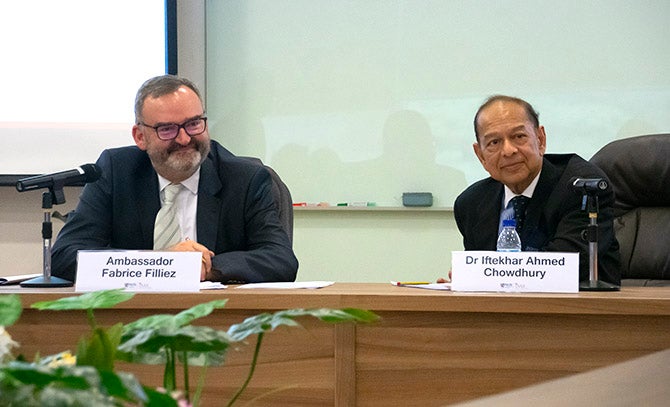
| Event Title: | Switzerland in Asia: Burgeoning Links with South Asia and ASEAN |
| Topic: | ISAS Ambassadors' Lecture Series |
| Date/Time: | 30 October 2018 | 15:00 - 16:45 |
| Venue: | ISAS Board Room, Level 9, Block B, 29 Heng Mui Keng Terrace, Singapore 119620 |
| Speaker/s: | Ambassador Fabrice Filliez |
| Chairperson: | Dr Iftekhar Chowdhury |
| Description: | Dr Iftekhar Chowdhury, principal research fellow at the Institute of South Asian Studies, NUS and former foreign minister of Bangladesh, chaired the session titled, ‘Switzerland in Asia: Burgeoning Links with South Asia and ASEAN’. He opened the session by highlighting the critical role that Switzerland plays as an international actor, contributing to stability, peace and progress in the region and the world. Dr Chowdhury lauded Switzerland for remaining a constructive place for situating international institutions and also the ability of the Swiss to enable dialogue between conflicting parties, as in the Gorbachev-Reagan Dialogue. Ambassador Fabrice Filliez described Switzerland’s relationship with ASEAN followed by Switzerland’s relationship with South Asia. On ASEAN, he mentioned the international cooperation activities that Switzerland has been pursuing in ASEAN, such as improving the living conditions of ASEAN people, reducing development gaps and providing humanitarian engagement. He sectioned Switzerland-ASEAN cooperation into 4 parts: climate change and disaster risk reduction, human security, vocational training and food security. He shared that there have been 26 projects, amounting to 7 million USD in these domains. On India, he celebrated the 70th anniversary since the signing of the Treaty of Friendship between the two countries. He also brought up the salient issue on cooperation with India on tax investigation, allowing automatic information exchange between the two countries. He also shared on the good relationship that Switzerland has had with Pakistan through investment protection, double taxation and disaster relief, with Bangladesh through poverty reduction, direct investment and development cooperation, and with Sri Lanka through reforms, reconciliation, investment protection and humanitarian assistance. Key questions that arose were regarding Switzerland’s view on referendums and tips on how the implementation of vocational institutes vis-à-vis university education was so successful in Switzerland. On the former, he answered that an educated population who are capable of practicing direct democracy was needed. On the latter, he shared the importance of acknowledging positive contribution to society and growth of the sector rather than the company alone. |


